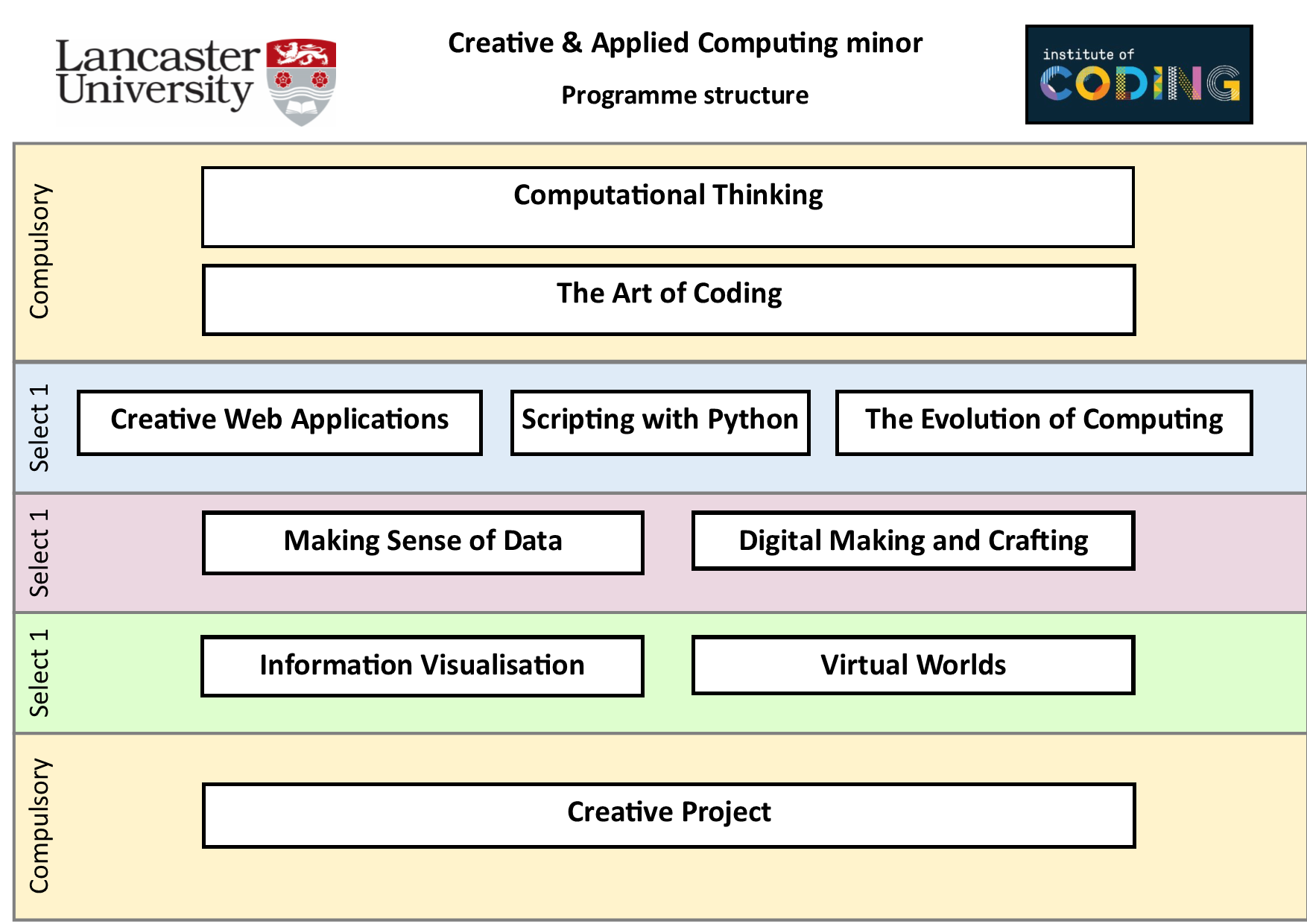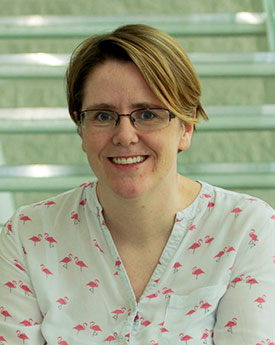The Institute of Coding (IoC) is a family consortium of learners, businesses employers, educators and outreach groups creating a new way to develop the digital skills you’ll need at work and beyond.
Working Together
Lancaster University is working with the IoC to create a new learning experience. This programme is a blend of traditional, radical and student-centred learning brought about by the first national collaboration of leading universities and innovative businesses.
So, whether you want to add a little digital to your current mix of skills, take the first steps towards a career in the digital economy or extend the specialist knowledge that you’ve already got, the Institute of Coding IoC is here to help you unlock your talent.

Minor in Computer Science
With the support of the Institute of Coding, the School of Computing and Communication is offering a unique minor in Computer Science: Creative and Applied Computing, for first-year non-computer science students at Lancaster University. Students will start the minor with two core modules, choose one optional module from each of Block A, B, and C options, and then complete a final group project. The minor is worth 40 credits, a third of your first year. Browse the tabs below for more information about each module.

Core Modules
These modules are compulsory.
SCC.010 Computational Thinking
Practical computing is all about problem-solving, and methods and techniques exist that provide a structured approach to solving those problems. This module introduces the core transferable skills in computational thinking, namely concepts in:
- algorithms
- abstraction
- decomposition
- generalisation
- handling common problems
- dealing with complexity
Students will be taught how to solve puzzles using unplugged activities.
SCC.011 The Art of Coding
This module introduces coding as a creative skill and a technique for applied problem-solving. Key concepts are introduced in the context of two languages: JavaScript and Python. Students will gain a solid foundation in these languages to help them with the following modules.
Block A
Choose from one of the following three modules
SCC.020 Creative Web Applications
Learn how to create interactive, web pages. Carrying on from the taster in the core module The Art of Coding, this course will allow students to further explore JavaScript and webpages, teaching them how to build interactive graphical webpages and to enhance these with information such as weather forecasts and geographical information.
SCC.021 Scripting in Python
This module provides a treatment of the principles of dynamic scripting languages, and how they can be used to solve real-world problems. The underlying principles of the Python language will be introduced, including file input/output, lists, structural typing and awareness of simple Object Oriented programming in Python. Students will also be briefly exposed to a world of open-source packages that can be accessed using the Python language.
SCC.026 The Evolution of Computing
The history of the field of computing tells a compelling story. Since the invention of the first mechanical computers in 1822, the disruptive effect of computing has continued to send ripples across global society. This module takes the student on a tour of the evolution of computing from its humble beginnings to the global commodity it has become, with a special focus not only upon the technologies themselves but also on the effects they brought upon society. The course takes a highly inclusive and diverse treatment - highlighting key figures from across the spectrum of society and their contributions. It also provides insights into how historic gender (and other) biases in the discipline have led to a weakened capability for countries like the UK to take advantage of their historic dominance in the field. The course concludes with some insights into the likely future evolution of computing.
Block B
Choose from one of the following two modules.
SCC.022 Making Sense of Data
This module outlines a series of introductory methods and approaches important to many data analysis or data mining projects. The module designed for a first-year student in disciplines such as natural sciences, human sciences, management, and engineering, with an interest of working and understanding data.
This module enables students to better describe data, prepare data sets for analysis, identify and understand groupings and relationships within data, and to build computational models that can interrogate such relationships.
There will be weekly tasks to understand the concepts and examine their applications. Each task will be assessed during the studio-style labs and the answers to the exercises will be provided at the end of the studio sessions.
SCC.024 Digital Making and Crafting
This module provides a focused introduction into Digital Making and Physical Computing using modern microcontrollers (such as Arduino and Micro:bit), new rapid prototyping methodologies (3D printing, foam-core), and an iterative design approach. Through both practical and theoretical perspectives, the module will introduce students to prototyping tools, fabrication and making, and programming and designing novel interactive physical devices. This module will combine hands-on learning through building, testing, and inventing new things, with discussions on broader implications and applications of digital crafting and physical computing.
Block C
Choose from one of the following two modules.
SCC.023 Information Visualisation
The course will focus on sketching and informational data, modes and methods of information visualisation, programs for visualisation, advanced options and interactivity in data visualisation. Students will have the opportunity to learn about representations, human-centric data visualisation, and how to manipulate these representations in meaningful ways to advance both their own understanding and in real-world applications. The aim of the course is to integrate meaningful data from interdisciplinary sources and develop a portfolio of data visualisation that can both inform and enhance their own subject area.
SCC.025 Virtual Worlds
Create your own virtual world! This module will introduce the core concepts of virtual environments, their capabilities and emerging trends through lecture led content. Students will be expected to sculpt their own examples using JavaScript-based libraries like Three.JS and A-frame. Programming skills acquired in previous JavaScript programming modules will allow the students to focus on implementation concepts. The use of JavaScript and browser-based WebGL will provide a flexible and responsive environment to explore concepts of viewing virtual worlds like camera and viewports; spatial concepts like coordinate systems, translation, orientation and scaling; models and animation.
Creative Project
SCC.030 Project
To end the programme, students will work in a group to complete a five-week project that applies their new skills to solve problems that are relevant to their majors. This will give the students an opportunity to go from the very beginning of a problem through to a working solution, giving them the confidence to apply their new skills in the following years of their degree and career
Outreach and Diversity
Outreach
With help from the Institute of Coding and in collaboration with the National Centre for Computing Education, we have run a Computer Science Discovery Day for students in Years 10 to 13 on Monday 23rd September 2019. 100 students from schools around Lancashire and Cumbria visited the university for the day to listen to keynote talks from people working in the computer science industry and took part in practical workshops to give them a taste of Computing. Undergraduate students were also be on hand to answer the students' questions and inform them of what Computer Science at university is like.
Diversity
Computing underpins and shapes almost everything we do as it is fundamental to how the modern digital world works. It is vital therefore that computing solutions reflect the diversity of the people that use them, which requires a diverse range of people to be involved in their development. At Lancaster, we are committed to making this happen! We have designed our minor in Creative and Applied Computing to welcome a diverse range of first-year undergraduate students into the exciting world of computing. You will have the opportunity to develop and apply important computing skills to your major subject whilst working with students from a range of different subjects. This will allow you to gain understanding about how important diversity is to computing by collaboratively developing computing solutions that reflect a range of interests and values. You can join us with no previous experience of computing and benefit from our "blended learning" approach, which means there are no formal lectures – you can study at times that suit you. Content is delivered online and complemented with sessions in our new studios where you are supported by our expert teachers. We are proud of our partnership with the Institute of Coding and uphold its principles of equality, diversity and inclusion in the digital world through both our research and our minor in Creative and Applied Computing.
Meet the Team
Dr Lynne Blair
Senior Research Associate for the Impact of Children's Auditory Technology, Visiting Teaching FellowSCC (Pervasive Systems)
Dr Angie Chandler
Senior Teaching Associate, Research AssociatePaul Dempster SFHEA
Senior LecturerSCC (Pervasive Systems)
Professor Adrian Friday
Professor of Computing and SustainabilityDSI - Environment, Energy Lancaster, MSF Supervisors 2019/20, Network and Systems, Pentland Centre, SCC (Pervasive Systems)
Lorraine Underwood
Research Associate in Computer Science, PhD studentDr Emily Winter
Lecturer in Computer ScienceSCC (Software Engineering), Security Lancaster, Security Lancaster (Software Security)








